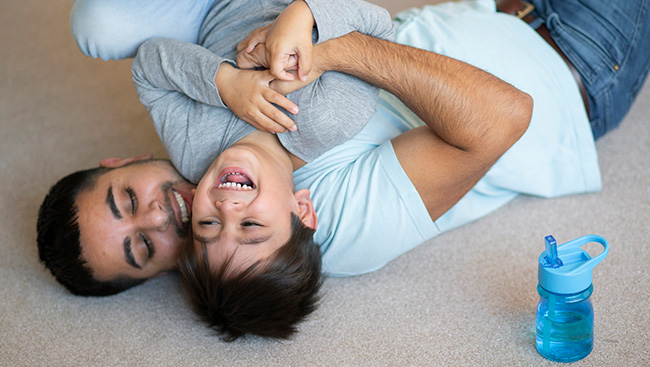With quarantines, lockdowns, and isolations - kids have very little distraction and are finding it tough to let off steam.
Imagine a two-year-old screaming his lungs out and running in circles for nearly an hour without a break. This is a regular phenomenon at my house. My little one has bouts of energy that are hard for him to channelize. These are some very challenging times - not just for parents but kids as well. With quarantines, lockdowns, and isolations - kids have very little distraction and are finding it tough to let off steam! We are talking about kids who are sweet, loving, and caring but are high on energy. To add to the energy, these kids also experience mood swings, throw in a temperament, adamance, and a tantrum.
According to a report on Today's Parent, it will be easier to call these children "high-spirited" instead of "challenging" "problem-child" or "difficult". Parents often begin to wonder if they have done something wrong resulting in the child behaving this way. If you have kids, who have similar experiences then be sure- you have been blessed with a high-spirited child. Now that we know what we are dealing with, let's look at some of the easy ways to engage high-spirited kids. Read on...

1 Give them space to release the energy
Kids who are high on energy crave for activities that can engage their curious minds. If not, they want a vast space to run around or indulge in physical activities. Let them play in the backyard or head to the park nearby for about an hour every day. If both are not possible at this point of time, a good evening walk for about an hour is also a good way to spend your child's energy. Enrolling in a sport - soccer, basketball, or karate could also really help.
2 Encourage attention to detail
Every time your child rushes through a task in a hurry or is very distracted - we suggest you don't accept their work. What's even worst is to do the job yourself. Make sure you ask your child to revisit the task. Prompt them in the right way if that is encouraging but do not accept a sloppy job. This will help them build focus and do the best at every task that is given to them.

3 Watch what they eat
What sort of diet your child follows can have a major impact on his energy levels! Food items that are high on carb and sugar can leave your child high on energy for hours together. A little sensibility while eating can have a positive impact on your child's thinking.
4 Sensitivity is key
Give them "no" as an answer and the waterworks just won't stop. Children, in general, are sensitive and they need someone who is sensitive to their emotions. Having said that, you need to be firm with them. The tantrum and the crying are because your child knows, you will probably cave in. It is in such situations that you need to prove how strong-willed you are. Tell them a no and explain why you are saying so. A little talking can help. You can also be empathetic and offer an alternative to their demand, this way you are acknowledging their emotions and at the same time, not giving in to what they want. Child business is tricky, you have got to do what's best for them.
5 Structured play is important
While I had earlier mentioned that kids need some space to just run around meaninglessly. It is also important at the same time to have some structure during their playtime. Include music, rhythmic songs, repeating beats, jumping, marching as part of the playtime. Even activities like jumping on a trampoline, climbing, or an obstacle course can be very helpful to channelize their energies and at the same time teach some structure.

6 Group activities with peers
Kids learn a lot from their peers. Group activities can be a great way to channelize a child's energy. They are working together and learning all at the same time. But there's a challenge with this one too. Fights and indifferences could crop up - teach them the value of sharing and friendship.
7 Reduce screen time
Kids these days love their gadgets but be cautious and monitor the time they spend looking at the screen. Studies have proven that screen time can increase a child's hyperactivity. Set a time limit on this one.

8 Teach them to sit idle & relax
While we have spoken a lot about spending the child's energy it is equally important for them to learn to relax their mind and body. After a good run or walk, teach them to sit idle, listening to soothing music. Even rocking your child or gently swinging them can be very relaxing. Changing the light settings (dimmer lights) can help them relax. They don't need to doze off but sit in one place to relax is important.





